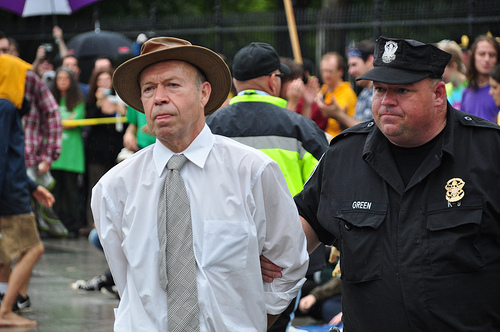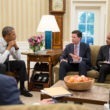(James Hansen quit NASA to mount a movement against carbon emissions: Fox News.)
The annual Ridenhour Prizes in Washington, D.C., awarded by the Fertel Foundation and the Nation Institute, last week celebrated 10 years of honoring whistleblowers, advocates, writers, and filmmakers who expose injustice and uncover corruption, often at great personal cost.
Each year I look forward to Ridenhour as a much needed “reset” after a long Washington winter of partisan politics – an important reminder of the selfless work of extraordinary people who devote themselves to social justice.
This year’s prizes were particularly aligned with my interests, as the Ridenhour Courage Prize was going to James Hansen, a NASA climatologist who has been doggedly sounding the alarm about climate change for decades, deferring not to mounting political pressure to silence him but to his own conviction to pursue the truth and share it in the public interest.
I run an organization that investigates misrepresentations of science by corporations and government, and here was a man who stepped down this month from his post as NASA’s top climate scientist to build a movement to stop global warming. Hansen recently told The New York Times, “As a government employee, you can’t testify against the government.”
| Hansen: “We need to not let politicians connect the dots because they have other forces acting on them, like money from lobbyists.” |
In the crowded reception room at the National Press Club before the ceremony, I recognized Hansen by his floppy brown hat – the same one I’ve seen in photos of his arrest in front of the White House in February, when he and 47 others were detained for protesting the Keystone XL pipeline. This time last year, Hansen’s Times editorial “Game Over for the Climate,” argued that if approved, the Keystone XL would facilitate the exploitation of Canada’s tar sands, which contain “twice the amount of carbon dioxide emitted by global oil use in our entire history.” And that, he said, would put civilization at risk.
I wanted to ask Hansen how to support other scientists who agree that climate change must quickly be halted but feel unable to express themselves publicly for fear of verging into the territory of advocacy. How do we compel truth-tellers to speak out in a political environment that often confuses whistleblowers for traitors?
“Some people say science and advocacy must be kept separate,” I began.
“Says who?” Hansen replied, in what I imagine is his professor voice. Then he smiled. “Scientists should not be afraid to speak out on the implications of the science. They are trained to be objective and connect the dots, from the causes of climate change to actions needed to stabilize things,” he told me. “We need to not let politicians connect the dots because they have other forces acting on them, like money from lobbyists.”
“Good science leads to clear conclusions,” he continued. “That’s why I said back in 1988, ‘it’s time to stop waffling so much and say that the evidence is pretty strong that the greenhouse effect is here.’”
Hansen was the first high-profile government scientist to issue a dire warning, decades before anyone was listening. At the Ridenhour Prizes ceremony this week, Hansen wasn’t alone in his endurance.
Seth Rosenfeld, Ridenhour Book Prize award winner for Subversives: The FBI’s War on Student Radicals and Reagan’s Rise to Power, filing five lawsuits under the Freedom of Information Act over the course of 27 years to receive the secret, hidden FBI files on which his book is based.
| Joe Romm: “We live in a spineless world, where being scientifically right for over 30 years gives you no more credit with the national media.” |
Ridenhour Documentary Film prizewinners Kirby Dick and Amy Ziering managed to produce The Invisible War, a film exposing the cover-up of U.S. military sex crimes, despite discouragement from all sides. The film has gone on to be cited in Congressional testimony and prompted legislation to intended to combat the epidemic of rape in the military.
Jose Antonio Vargas, journalist and author who received the Ridenhour Prize for Truth-Telling, spoke passionately via a pre-recorded video about spending his adult life hiding his undocumented status, before coming forward in a courageous essay in The New York Times Magazine, outing himself in solidarity with the estimated 11.5 million people living in the U.S. without papers.
Hansen, for his part, used his Ridenhour award speech to call for a gradually increasing carbon tax, with 100 percent of the revenue returned to the public. “We cannot burn all the fossil fuels without handing our children and grandchildren a situation that is out of control, with huge consequences for their well-being.”
The facts have borne him out.
Just this week, the Environmental Protection Agency issued a report that said mining the Canadian tar sands would result in the release of an additional 935 metric tons of carbon dioxide into the atmosphere over the next 50 years.
Facts prevail, but they are not enough. As climate blogger Joe Romm noted when introduced Hansen: “We live in a spineless world, where being scientifically right for over 30 years gives you no more credit with the national media than being a professional disinformer funded by the fossil fuel industry.”
Hansen’s comment about connecting the dots, then, becomes the prevailing principle behind the accomplishments of the Ridenhour awardees. This year’s prize-winners are truth-tellers, but they are also storytellers of the highest order. They have connected the dots in service to equality, sustainability, and justice, and they have done so not for personal gain or celebrity but because they were animated by important work not yet complete.
As we parted, I thanked Dr. Hansen for his significant contributions to the climate movement. He shook my hand and headed for the doors to the ballroom, beyond which four hundred people awaited his words. Then he stopped, trained his discerning blue eyes on me, and said, “We’ve not yet been effective. These next few years are critical.”
Alison Fairbrother is a contributing editor for The Washington Spectator and director of the Public Trust Project, a nonpartisan, nonprofit organization that investigates and reports on the manipulation of scientific research by corporations and government.




0 Comments